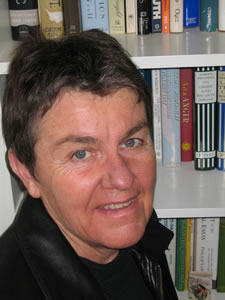De Schotse schrijver Irvine Welsh werd geboren op 27 september 1958 in Leith, Edinburgh. Zie ook mijn blog van 27 september 2008.
Uit: Porno
“Croxy, sweating from exertion rather than from drug abuse for once in his life, struggles up the stairs with the last box of records as I collapse on the bed, gaping through a numb depression at the cream woodchip walls. This is my new home. One poky room, fourteen foot by twelve, with an attached hallway, kitchen and bath-room. The room contains a built-in wardrobe with no doors, my bed, and just about space for two chairs and a table. I couldn’t sit in here: prison would be better. I’d fucking well go back up to Edinburgh and swap Frank Begbie his cell for this frozen hovel.
In this confined space the stench of old fags from Croxy is suffocating. I’ve gone three weeks without a cigarette, but I’ve passive-smoked about thirty a day just from being in his proximity. – Thirsty work, eh, Simon? You coming down the Pepys for one? he asks, his enthusiasm seeming like a gloat, a calculated sneer at one Simon David Williamson’s reduced circumstances.
On one level it would be sheer fucking folly to go down Mare Street, to the Pepys, so that they can all snicker, ‘Back in Hackney, Simon?’ but, aye, company is what’s wanted. Ears must be bent. Steam has to be let off. Also, Croxy needs an airing. Trying to give up fags in his company is like trying to come off gear in a squat full of junkies.
– You’re lucky to get this place, Croxy tells me, as he helps me unload the boxes. Lucky my fuckin arse. I lie down on the bed and the whole joint shakes as the express train to Liverpool Street hurtles through Hackney Downs station, which is about one foot outside the kitchen window.
Staying put in my state of mind is even less of an option than going out, so we’re cagily descending the threadbare stairs, the carpet so worn that it’s as hazardous as the side of a glacier. Outside, sleet falls and there’s a dull aura of festive hangover everywhere, as we make our way towards Mare Street and the town hall. Croxy, with absolutely no sense of irony, is telling me that ‘Hackney’s a better manor than Islington, any roads. Islington’s been facked for years.’
You can be a crustie for too long. He should be designing websites in Clerkenwell or Soho, rather than organising squats and parties in Hackney. I put the cunt wise to the ways of the world, not because it’ll do him any good, but simply to stop nonsense like that filtering into the culture unchallenged. – No, it’s a step backwards, I say, blowing on my hands, my fingers as pink as uncooked pork sausages. – For a twenty-five-year-old crustie, Hackney’s fine. For an upwardly mobile thirty-six-year-old entrepreneur, I point at myself, it has to be Izzy. How can you give a class bit of fanny in a Soho bar an E8 address? “

Irvine Welsh (Edinburgh., 27 september 1958)
De Amerikaanse dichteres Kay Ryan werd geboren op 27september 1945 in San Jose, California. Zie ook mijn blog van 27 september 2008.
All Shall Be Restored
The grains shall be collected
from the thousand shores
to which they found their way,
and the boulder restored,
and the boulder itself replaced
in the cliff, and likewise
the cliff shall rise
or subside until the plate of earth
is without fissure. Restoration
knows no half measure. It will
not stop when the treasured and lost
bronze horse remounts the steps.
Even this horse will founder backward
to coin, cannon, and domestic pots,
which themselves shall bubble and
drain back to green veins in stone.
And every word written shall lift off
letter by letter, the backward text
read ever briefer, ever more antic
in its effort to insist that nothing
shall be lost.
Tenderness and Rot
Tenderness and rot
share a border.
And rot is an
aggressive neighbor
whose iridescence
keeps creeping over.
No lessons
can be drawn
from this however.
One is not
two countries.
One is not meat
corrupting.
It is important
to stay sweet
and loving.

Kay Ryan (San Jose, 27 september 1945)
De Tsjechische schrijver en uitgever Josef Škvorecký werd geboren op 27 september 1924 in Náchod. In 1943 deed hij eindexamen gymnasium. Omdat hogescholen en universiteiten in die tijd gesloten waren werd hij te werk gesteld in de Messerschmittwerke in Náchod. Na de oorlog begon hij aan een studie medicijnen in Praag, maar hij stapte al snel over op filosofie en anglistiek. In 1951 promoveerde hij. Na twee jaar militaire dienst ging hij werken als redacteur bij een staatsuitgeverij. Vanaf 1956 was hij redacteur bij het tijdschrift Světová literatura (Wereldliteratuur). Zijn eerder geschreven, maar in 1958 gepubliceerde debuutroman Zbabělci (Lafaards), veroorzaakte een schandaal en hij moest zijn baan opgeven. Toen het klimaat in de jaren zestig in Tsechslowakije verbeterde besloot hij beroepsschrijver te worden. In 1969 kon hij met een beurs een jaar naar Californië. Na afloop daarvan vestigde hij zich in Toronto waar hij aan de universiteit doceerde en met zijn vrouw de uitgeverij Sixty-eight Publishers oprichtte. Deze werd een Mekka voor verbannen schrijvers als Václav Havel, Milan Kundera en Ludvík Vaculík.
Uit: The End of Bull Mácha (Vertaald door Paul Wilson)
“Bull Mácha was leaning against the pedestrian railing at the corner of Vodičková Street and Wenceslas Square. The thin mist of a dank afternoon was slowly falling into the streets, blurring the features of the people trudging past him. The streets were coming alive with the bustle of a Sunday evening in the big city. Through the silvery grey veil of a wet autumn dusk the lights in the store windows and cafés were coming on, and the faces of the girls Bull Mácha’s impassive eyes were stalking in the crowd seemed to assume a new and mysterious charm under the misty, magic chiaroscuro of artificial lighting. Their hazy beauty touched him like a sudden pain, and in the depths of his heart he longed to draw close to them in a place where one could get closest of all: a café, one of the dance halls whose windows were already beginning to glow through the spidery mist that was slowly descending upon the city of Prague. It was the month of November in the year of our Lord 1953.
The figure leaning against the green railing, with his low, carefully combed coiffure turned to face the flaming entrance of the Soviet Book Shop, was in his own way a living human fossil. At the age of twenty-nine, František Mácha still referred to himself by his old nickname, Bull, in full “Gablik” Bull—Zoot-Suiter Bull—and he insisted that others do so too. And the vague notion of belonging to a grand conspiracy against something uncertain, a conspiracy he still felt a part of, was epitomized, even after all these years, by the title “Gablik.” It was an expression that ha
d stuck to him long ago, during the vogue for a popular American Civil War movie and its raffish, devil-may-care hero, Gable himself.
Now Gablik Bull Mácha was standing on the corner of Vodičková Street and Wenceslas Square, his heart lacerated by those winsome, cosmetically improved young faces, and by a strange, miserable nostalgia. He was alone, his hands stuffed into enormous pockets, and from the overcoat, cut strictly according to fashion with the sloping shoulders of a wine bottle and a collar as wide as an acolyte’s, a small head emerged, with a painstakingly fashioned coif in front and the sides slicked back into a ducktail. From that face two watery grey eyes stared: dull, bored, desperate. Bull had the heel of his left foot hooked over the bottom rung of the green railing, with his leg swung over as far as he could to the left, and he had pulled up his narrow trouser leg to avoid making a bulge at the knee, so that all might remark on his black-yellow-and-green-striped socks and gaze in wonder at the Gothic upturned toes of his Hungarian winklepickers. He was especially proud of those winklepickers with their snow-white soles flashing in the descending fog like crown jewels, cared for with boundless love and worn only on ceremonial occasions.”

Josef Škvorecký (Náchod, 27 september 1924)
De Nederlandse schrijfster Esther Verhoef-Verhallen werd geboren in ’s-Hertogenbosch op 27 september 1968. Haar eerste publicaties verschenen in 1989 en betroffen columns in het blad Flair. Tussen 1995 en 2005 schreef ze 50 informatieve boeken over huisdieren, waarvan er wereldwijd zo’n 8 miljoen over de toonbank gingen. Haar dierenboeken zijn vertaald in ruim 80 landen. Verhoef deed zelf grotendeels de fotografie voor haar boeken. Bekendheid bij het grote publiek verwierf zij echter pas toen zij thrillers begon te schrijven. In 2003 debuteerde ze met de thriller Onrust, die in 2004 werd genomineerd voor de Gouden Strop en spoedig daarna vertaald in het Duits. De opvolger Onder druk werd genomineerd voor de Gouden Strop 2005.
Op 7 april 2006 kwam haar eerste psychologische thriller Rendez-vous uit, die vrijwel meteen in de bestsellerlijsten belandde. In oktober 2006 verscheen Chaos, een roman noir/thriller over een ex-militair met een posttraumatische stressstoornis, die zij samen schreef met haar man Berry Verhoef onder het pseudoniem Escober. In 2007 kwam Close-Up uit. In 2008 volgde Ongenade (Escober) als hekkesluiter van de Sil Maier-trilogie.
Uit: Close-up
“Het maakte het makkelijker dat we elkaar zo goed kenden. Daardoor werkte ze, zonder het te weten, mee, en werd het intiem, geborgen bijna. Drie maanden heb ik me erop voorbereid. Eerst heb ik het plan aan alle kanten belicht. Geprobeerd het voor mezelf te visualiseren. Toen ik zeker wist dat het mogelijk moest zijn, was het geen gedachtespinsel meer, maar werd het een deel van mezelf. Het was heerlijk om ermee bezig te zijn, vanaf de voorbereidingen, die bestonden uit gesprekken met haar en de mensen om ons heen, tot aan het aanschaffen van de spullen die ik nodig had. Toegegeven, veel was dat niet. Ze bracht me zelf op het idee.
Edith kon niet zo goed tegen gebroken nachten, dan waren haar ogen de volgende ochtend dik en rood. En hoewel ze veel meer in huis had dan schoonheid alleen, wilde ze vóór alles mooi zijn. Wat mij betreft was ze dat altijd, of ze nu in vol ornaat op een receptie de show stal of net uit bed kwam en, zich verontschuldigend voor haar slonzige verschijning, in badjas thee voor me zette. Een slaapmiddel was voor haar de enige manier om niet steeds wakker te worden van het gerommel ’s nachts.
Ik keek ernaar uit, voelde me als een kind dat in de rij stond voor de achtbaan. Steeds een stapje vooruit, steeds dichterbij. De toenemende opwinding, die zijn hoogtepunt bereikte op de avond dat alles als een perfect passende puzzel in elkaar viel.
We hadden samen een fles wijn leeggedronken en het gehad over dingen die ons boeiden. Over kunst en kunstenaars, die de ondoordringbare en onbegrijpelijke wereld van de fantasie en emotie tastbaar maakten voor het grote publiek. Kunstschilders, beeldhouwers, schrijvers, muzikan
ten.
Ze was heel relaxed en leunde tegen me aan. Meer dan eens zei ze dat ze zich bij mij zo op haar gemak voelde, dat ze me helemaal vertrouwde. Ze was al aan het wegzakken, het middel werkte opvallend snel. Ik drukte haar tegen me aan en zei dat ze beter even in bad kon gaan. Ze was moe, ze had te veel meegemaakt, en na een verkwikkend bad en een goede nachtrust zou ze minder zwaarmoedig tegen alles aan kijken. Morgen zou ze zich vast beter voelen.”

Esther Verhoef (‘s-Hertogenbosch, 27 september 1968)
Zie voor nog meer schrijvers van de 27e september ook mijn vorige twee blogs van vandaag.









